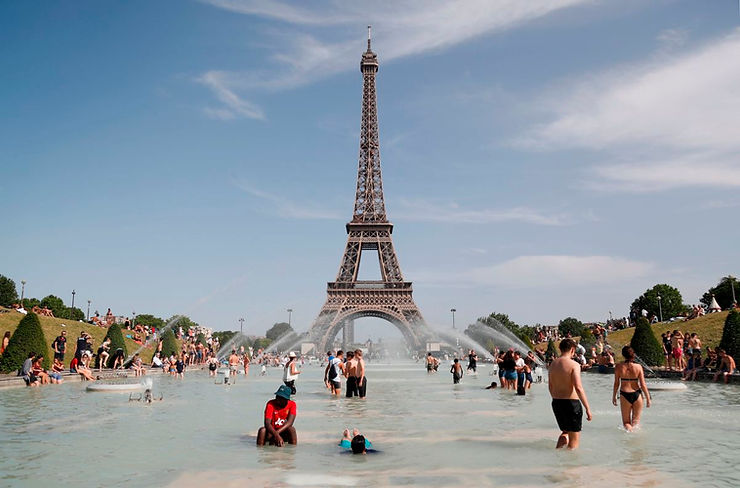By: Henry Wang
A dangerous heat wave is being recognized across a vast majority of western Europe. The cause of which is hot air blowing in from Africa that is causing temperatures to escalate higher and higher.
The State meteorological Agency in Spain called the heat wave “the earliest major heat wave in more that 40 years” while in France, authorities took note that they’ve never recorded a temperature in history this early in June that topped 104 degrees (40 Celsius).
Weather stations in France recorded some of their hottest temperatures in the month of June with 2 regions reaching their highest day on record. Pissos, a town in southwest France reached a climax of 107 degrees (41.7 Celsius), while Revel reached a bit cooler of a temperature of 104 degrees (40.2 Celsius).
On Wednesday and Friday, the Valencia province in Spain had some of the hottest June temperatures since 1950. And on Friday, the Valencia airport set a record for a June high temperature at 102 degrees (39 Celsius), this beat the last record that was set back in 2017.
In southern Spain, Andújar received one of the highest temperatures recorded in this heat wave. On Friday, Andújar hit 111.5 degrees Fahrenheit (44.2 Celsius).
After Friday, the heat wave is expected to dwindle in Britain and dwindle a little less in Spain but get a boost on Saturday in France. Also, Germany, Poland, and Austria are all going to be surprisingly hot throughout Saturday and Sunday. Afterward the heat is predicted to direct itself towards southern Europe some time earlier next week.
Authorities in Spain issued many heat warnings and nearly put the whole country under “extreme risk” of a wildfire. Thousands of people have been evacuated from the area while the firefighters try to contain the fire.
Hundreds of baby birds died in southern Spain after leaving their burning nests too soon. Scientists say that the first heat wave was at the same time of the hatching season for a protected bird species called swifts. In the Guardian newspaper, the biologist Elena Moreno Portillo explains that the nests that the birds make are commonly built inside the empty space of buildings. These buildings however are generally made from materials like concrete and sometimes metal. Moreno Portillo says, “So it becomes an oven and the chicks, who can’t fly yet, rush out because they can’t stand the temperature inside,” Moreno Portillo also says, “They’re literally being cooked.”
With the combination of extreme heat and lack or rain, some of Europe’s most major rivers are dwindling to very low levels. Italy’s largest river, Po, is so low that the shipwrecks in the river are now reemerging from the water. Authorities in northern Italy are now getting increasingly worried about the possibility that they may experience water shortages.
After a devastating heat wave in 2003 that resulted in over 14,000 people killed in France (and over 30,000 deaths across Europe), French nursing homes now have air-conditioning and added ventilation along with sprinklers.
However, France and Germany both are noted to have roughly only 5 precent or fewer residential houses that contain air conditioning. To compare, over 90 precent of civilians in the United States have access to air conditioning at their home.
Promoting people to set their air conditioning a little less cool is starting to be taught to people in a few European countries. This is all to strip down electricity and dependance on any Russian natural gas. Italy’s “operation thermostat” even goes as far to give the advice that 77 degrees (25 Celsius) is the coolest that their air conditioning should reach.
City authorities in Paris support civilians to use a dedicated website to find over 900 “islands of coolness” which include parks, cemeteries, swimming pools, and even museums. Also, the website gives you dedicated “cooling routes.” For example, a pathway with lush trees that connect to where you’re going. Misting devices are used for other French cities.
Climate scientists, however, say that more needs to be done as climate change becomes more and more intense with the heat becoming more and more frequent.
Hannah Cloke, a climate scientist from the University of Reading, says that Britain was “really not prepared” for the intense temperatures, with many buildings like offices or houses “not built to help keep people cool.”
“People aren’t taking it very seriously. They think about ice creams and having fun, but they aren’t seeing the risk for vulnerable people,” Cloke says. The amount people in Britain who die to heat waves every year are in the hundreds.
On Friday, a multitude of people race over to swimming pools, ponds, fountains, and more in order to beat the heat.
A 47-year-old babysitter named Sandra Greenridge accompanied the toddler she was supervising to the Southbank Center cultural complex in London.
“We may be here fore hours,” Greenidge says while the toddler squirmed out of her reach to stumble into the fountain.











